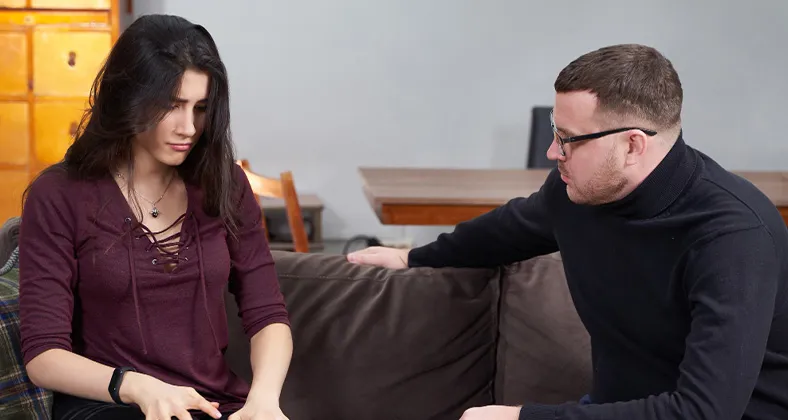Relationships are like the thread that has to be tied in a tight knot so that it won’t slip and won’t open. They play a critical role in everybody’s life and provide love and companionship, which is very supportive. If we talk about conflict and relationships, there are possibilities that there might be misunderstandings or miscommunications that must be sought so that the relationship can be at its best and all the problems are cleared. Seeking professional assistance through counselling and therapy can be very helpful in addressing relationship issues when disagreements and arguments increase. This blog will teach you the best ways to overcome difficulties and solve problems. So, continue reading the blog and discover how a counsellor can help you heal your internal issues.
What are relationship conflicts?
Conflicts mean fights and disagreements. In the same way, relationship conflicts are disagreements, arguments, and debates; these are also the struggles between two people with shared interests. Conflicts occurring in the relationship occur every day. There is no way that the two of you could get along and never argue. When handled properly, conflicts in a partnership can eventually improve your marriage or relationship.
What are some common causes of conflict in relationships?
Here are some of the common causes that might cause conflict in relationships:
- Trust Issues: Relationships can be strained by mistrust of someone’s honesty and dependability.
- Communication problems: Misunderstandings and inadequate communication can cause annoyance and strife.
- Unresolved Past Issues: Tension can arise from lingering issues from the past that come up again.
- Jealousy and insecurity: These emotions have the potential to escalate hostilities.
- Lack of Boundaries: Conflict and overstepping can result from unclear boundaries.
When is conflict healthy in a relationship?
As you might have also heard earlier, a healthy couple or relationship is perfect when the couple has a few arguments to get to know each other perfectly.
So, healthy conflict involves open communication, active listening, and a willingness to compromise. It enables people to communicate their wants and boundaries, which promotes a closer bond. In addition to fostering resilience and trust, conflict teaches couples new things about one another. When disputes are handled with grace, they present chances for relationship and personal growth. Remember, it’s not about winning or losing but finding common ground and strengthening the bond between partners, so relationship and conflict management should be proper.
When is conflict in a relationship not healthy?
Sometimes, the conflicts can become unhealthy and lead to major fights. Conflict becomes harmful when there is more negativity than optimism in the conversation. Gottman’s research demonstrates the average ratio of positive to negative feelings during conflict. In sad couples, the ratio was 8 to 1, whereas in happy couples, it was 5 to 1.
Similarly, in healthy conflicts, positive emotions occur due to the repairs being made when the partner’s feelings are heard and accepted. Suppose the fight includes defensiveness, criticism, contempt, and stonewalling. When these exist in a relationship, there is a good chance that the relationship will eventually break. Flooding is also a type of fight that might lead to emotional damage. This happens when you are left shell-shocked by your partner’s extreme and abrupt negativity, whether it takes the form of criticism, disdain, or even defensiveness.
How can relationship conflict bring you closer together?
Navigating conflict in relationships can be improved by focusing on some of the major things:
Understanding Differences: Conflict can promote empathy and understanding of one another’s viewpoints and differences.
Problem-Solving Together: Working through conflicts needs cooperation, promoting collaboration and joint problem-solving skills.
Building Trust: Successfully navigating conflicts builds trust, showing that you can rely on each other even in challenging situations.
Better Communication: Resolving disputes promotes honest dialogue, strengthening bonds and improving understanding.
Personal Development: Dealing with disagreements offers chances for development and self-awareness, improving your capacity to deal with difficulties.
Strengthening Resilience: Going through devastating disagreements as a couple fortifies your resilience and gets you ready for life’s ups and downs.
How do you deal with conflict in a relationship?
- Learn and Grow: Use conflicts to learn about each other and strengthen your relationship.
- Listen up: Listen to each other out without interrupting. Let them share their side of the story.
- Express Feelings: Use “I feel” statements to sidestep blaming. Share your feelings calmly.
- Take a Timeout: If things get heated, take a break. Cool off and come back to the conversation.
- Find Common Ground: Identify shared goals or interests to bridge the gap.
- Seek Understanding: Ask questions to understand their perspective better.
- Compromise: It’s not always about winning. Aim for solutions that work for both.
- Apologise and Forgive: If necessary, say sorry. Forgive and move forward.
How Can Counselling Help in Resolving Relationship Conflicts?
The counsellor will assist in getting the most out of your relationship. They will help you maintain and recover the spark in your relationship. Discussing it with the consultants will allow you to build communication and express your feelings to one another. Professional therapists assist couples in expressing their emotions, figuring out underlying problems, and acquiring useful communication techniques. By managing emotive wounds and improving communication, counselling licenses couples to navigate challenges, maintain their bond, and build a healthier, better connection.
Summing it up:
This blog has all the information about relationships and how to cure conflict resolution in relationships. Counselling and therapy can help you communicate more effectively, find underlying problems, learn how to resolve conflicts, mend emotional wounds, become more self-aware, fortify relationships, and offer an objective viewpoint.


